hockey exit
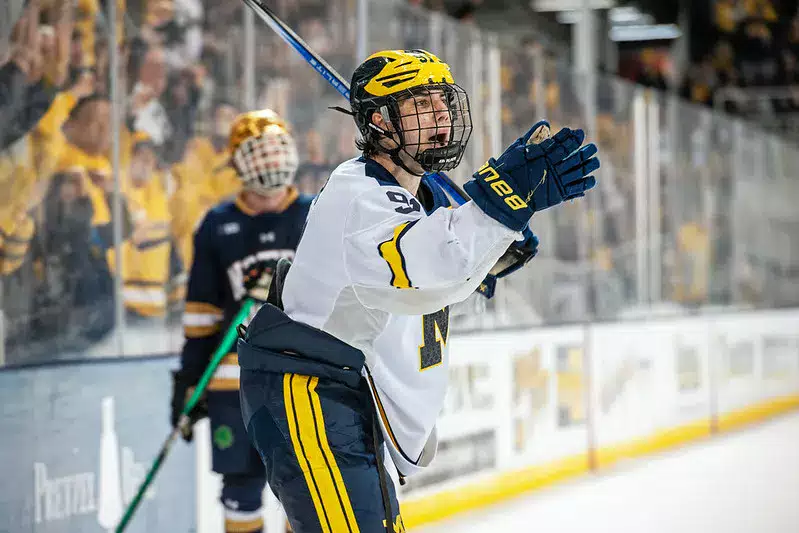
As the college hockey season comes to an end, we bid adieu to a number of key players on the Michigan team. Some players are moving on to occupations that they got a degree in college for, while many others will be giving professional hockey a shot. Some of these are players exhausting eligibility and were forgone conclusions to depart, including goaltender Jacob Barczewski, defenseman Marshall Warren, forward Chase Pletzke, and practice goalie Andrew Albano, all of whom completed their 5th year of eligibility.
But there's also the bucket of star players who are signing prematurely with the NHL teams who hold their draft rights. Michigan is no stranger to these sorts of losses and this year we've got three of them to cover. Like Alex did in past years, lumping them together in one combined the post is the best way to break it down and that's what we will be doing today. Three impact forwards recently signed NHL Entry level contracts and have moved on to the organizations who drafted them, with a rundown of each below:
Exit: Frank Nazar III
Sophomore Frank Nazar III was a 1st round draft pick (13th overall) in 2022 by the Chicago Blackhawks. The Mount Clemens native came to the Wolverines via the US NTDP Program in Plymouth as part of the 2022 recruiting class. Nazar's profile was built around the promise of his speed, skill, and offensive aptitude, but it took a while for us to see it unleashed due to injury. His freshman season last year was hampered by offseason surgery, as Nazar was unable to play his first game of the season until February 10th. He finished that season with only 13 games played and didn't feel like we ever got a true glimpse of what Nazar could be.
This season, as a sophomore, Nazar was finally healthy and able to play in all 41 games for the Wolverines. He centered the 2nd line, where it was not uncommon for him to be lined up against the opposition’s top line on a nightly basis. Nazar was one of the best in the nation in the faceoff circle, winning 54.7% of faceoffs he took, leading to heavy deployment. Night in and night out he was the most consistent 200 foot forward for Michigan as he notched 17 goals and 24 assists for 41 points in 41 games. Of those 41 points, one towered above the rest, his sensational between-the-legs pass to Gavin Brindley for his goal 12 seconds after the Wolverines took the lead in the Regional Final against MSU:
His Pro Hockey Potential: Frank Nazar III has already begun his NHL career, signing with the Blackhawks on April 14th and scoring his first NHL goal 10:05 into the first period on a breakaway. As sensational as this was for him, don’t expect him to start putting up superstar offensive numbers. What the Blackhawks are getting more of a two-way player than an offensive dynamo, one who has a high hockey IQ, quick feet, and a strong stick which will allow him to be in good defensive position and the ability to use those assets to transition the puck up ice into scoring opportunities. As he develops, look for Nazar III to be the Blackhawks shutdown center who will face the opposition’s top line every night, a contrast to Connor Bedard's offensive prowess. He should also be slotted on the top PK unit and also get time on the 2nd PP unit.
[AFTER THE JUMP: Brindley, Duke, and bigger picture thoughts]
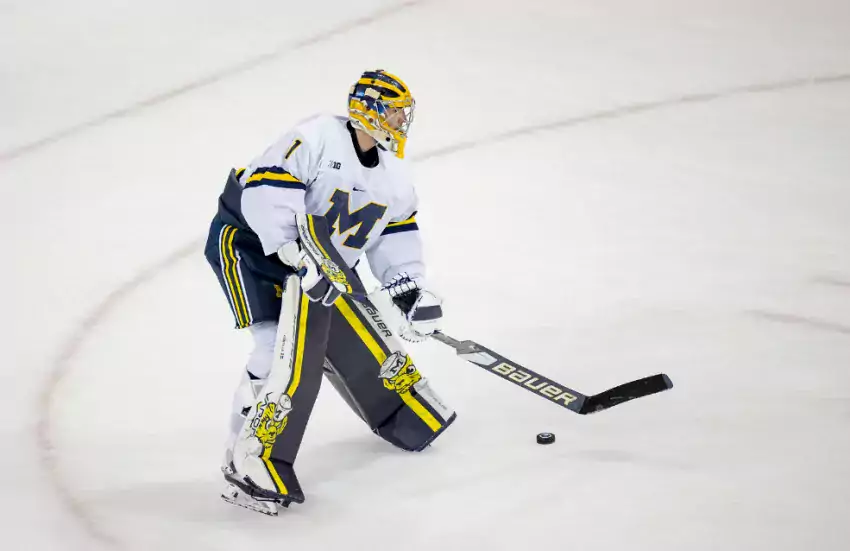
Michigan's goalie search is officially on, as the Ontario Reign, the AHL affiliate of the Los Angeles Kings, announced they've signed Portillo to an ATO contract.
We've signed @umichhockey goaltender Erik Portillo to an ATO! Welcome aboard the #ReignTrain, @ErikPortillo20!
— X - Ontario Reign (@ontarioreign) April 10, 2023
An ATO stands for amateur tryout agreement, but in practice it means Portillo is going pro but agreed not to count this year towards his entry-level clock. He'll be getting his feet wet in the AHL over the remainder the season, and is almost certain to sign an entry-level deal when it's over. (I'll explain further below). Portillo was drafted in his 18-year-old season by Buffalo, who traded his rights last month to the Kings. LA will keep him on an entry-level contract through the 2025-'26 campaign.
Michigan will also lose a trio of seniors who provided some much-needed experience on the back end of this year's team. Gritty Nick Granowicz centered the checking line, and has a COVID season left to play. He scored 36 points in 101 games for Michigan in the last four years, but participated in senior night, and was expected to move on. Ciccolini might be a bigger surprise; the forechecking winger lost a big chunk of the middle of his Michigan career to injury—including the entire 2021-'22 season—but was a drafted player (7th rounder in 2019) and had a few streaks where he was able to convince us he was about to finally break out.
Blueliner Keaton Pehrson was also a senior, and a steady presence over four seasons when it seemed every other defenseman on the roster was getting injured just so Pehrson could stay on the top defensive pairing. Over the years #20 was often the other guy out there with Cam York, Owen Power, or Luke Hughes. His presence there couldn't by justified by a scoresheet, but Pehrson was the epitome of a guy who does his work off the puck. His final year was his best, with 11 assists, and four crucial blocks in the banner-clinching win at Minnesota in the Big Ten Tournament. He never did develop his on-the-puck game.
While the skaters are making room for youth, Michigan will definitely be a player in the goalie portal now, since backup (who came to be a backup) Noah West is also in the portal, and freshman Tyler Shea is an overager who only dressed for three games this year. Brown goalie Mathieu Caron seems like the one and only target for now; the rising junior put up a 2.49 GAA and 92.1 save percentage for a terrible ECAC team. No other goalie in the portal looks plausible, though you never know who else might pry loose.
Putting Portillo's Michigan career in context is difficult since we're still in the shadow of its nadir. Backing up Strauss Mann as a freshman, Portillo put up numbers equal to the elder star. As a blue-chip prospect, it was understood that the massive Portillo would inherit the job in 2021-'22, and Mann duly departed for a pro career. Michigan had virtually no drop-off, as Portillo was one of the best goalies in the country as a sophomore. He was expected to take another step forward as a junior, but it didn't work out that way. He made some incredible stops, had some great games, and enjoyed coming out of his net to play the puck even more than his fans hated when he did that. He also began making crude mistakes, taking awhile to get back up after going to the ice, losing his poise, losing his stick, and most egregiously losing the Frozen Four semifinal after giving up two bank shots and sharp-angle softy.
Part of the problem might have been that Portillo was working without a goalie coach—Steve Shields left the program after his complaints triggered the investigation that brought down Mel Pearson, and the volunteer assistant who replaced Shields took another opportunity in the middle of this season. It's hard not to see a correlation between the coaching situation and Portillo's fundamental breakdowns. It's also hard not to see the giant Swede developing into a fine NHL goalie in a few years.
Why does an amateur deal mean he's gone?
The current collective bargaining agreement between the NHL and its players union keeps entry-level salaries locked to prescribed maximums for their draft positions for (usually) three years. The clock doesn't start until they're out of college, but college hockey ends weeks before the NHL/AHL regular seasons, and sometimes players get signed and spend those last few weeks as professionals, burning through one of their entry-level years in the process. In general teams want to keep their draftees on entry-level contracts, and players want to get past that, so when you see a Matty Berniers jump to the NHL immediately it often means his team is willing to give up an entry-level year to entice him to come.
On the flipside, for a guy who isn't ready for the NHL however, the added franchise value of being on an entry-level contract can be a good thing, since the team that owns his rights can afford to be patient with his development, and might favor a cheap asset who's under team control. However if the player gets all the way through his senior year in college, the team that drafted him actually loses his rights. Portillo was a junior, but could have played one more season and become a free agent. This was the impetus for the team that drafted Portillo in the 3rd round, the Buffalo Sabres, to trade his rights to Los Angeles. At that point we figured Portillo was gone, because teams don't usually acquire those rights unless they're confident they will sign him and he'll forego his senior year.
Signing the ATO and joining Ontario means he intends to sign with LA next year, but also wants to play out the end of the AHL season without having it count as an entry-level season. Even though it literally says "amateur" in the title, signing an ATO is considered signing with a pro team by the NCAA's definition, so Portillo's collegiate eligibility is over.
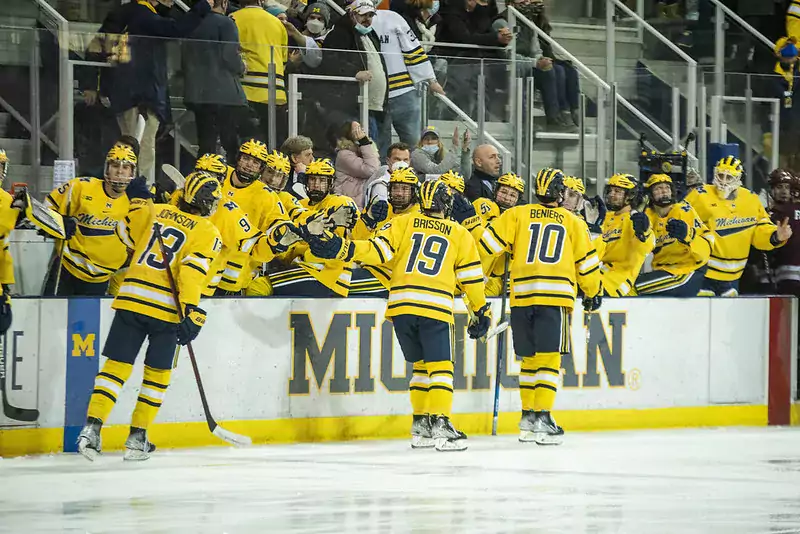
Typically we do a formal exit post when someone big from basketball or football leaves the team, and sometimes that is the case for hockey. We did not do one last week even though there was a spate of exits precisely for that reason: so many big name players were exiting for NHL/AHL deals that doing one post for each would have left you all drowning in exit posts. Instead, it felt better to do one big piece that gives a short farewell to each player that is heading to pro hockey, with a bonus take on how they will do at the next level. So here goes the Hockey Exit Bonanza.
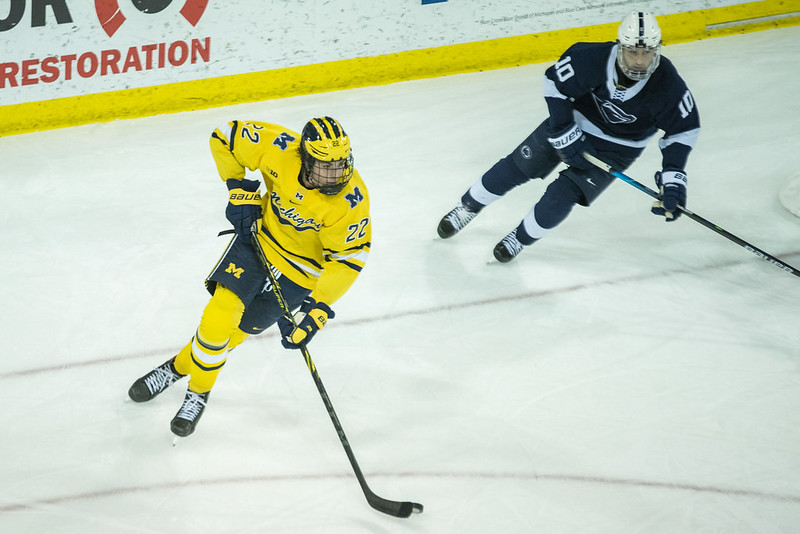
[James Coller]
Exit: Owen Power
First up is Michigan's towering defenseman, the #1 pick in the 2021 NHL Entry Draft. Power was signed by the Buffalo Sabres shortly after Michigan's season concluded and he made his NHL debut last weekend in Toronto against the Leafs. Power played two seasons at Michigan, scoring 32 points in 33 games this past season to earn All-America honors. Power's 6'6" height was his defining characteristic, but his ability to skate well and comfortability cycle down into the corners of the offensive zone made him a rare find. Given the typical dimensions of hockey players, it is quite possible Michigan will not have another player with Power's exact traits for several decades. Power played top minutes this season, often paired with either Nick Blankenburg or Keaton Pehrson, and also played heavily on the power play.
His NHL potential: Power is someone I've generally been a bit lower on than some of the scouts, because I didn't feel like he was Michigan's best defenseman (I would say Luke Hughes for that) this season. I also was frustrated by Power's unwillingness to use his size while defending, but I will admit that the NCAA is a much softer game than the NHL. That said, the toolkit is absolutely there, and the Sabres will have plenty of opportunity to mold Power how they want him. Power was 17 when he enrolled at Michigan, meaning he's only 19 now, and defensemen take longer to develop in the league than forwards. Guys who are 6'6" and can skate don't come around every day. If he learns to be a bit more aggressive in his own end and plays the point well offensively, it's not inconceivable he could be Dougie Hamilton in three or four years. Even if he doesn't, Power will have a lengthy NHL career because Big Body Canadian Boys who play defense always do.
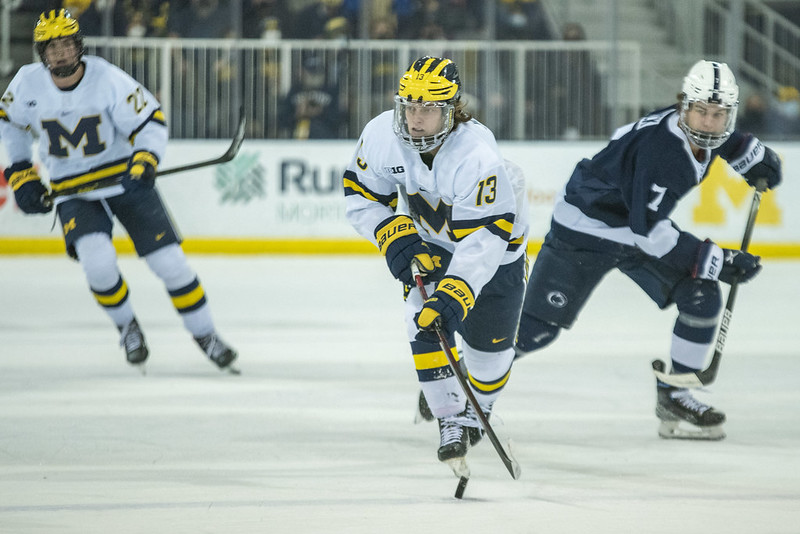
[James Coller]
Exit: Kent Johnson
The other name who signed quickly after Michigan's season ended was Kent Johnson, inking an entry level contract with the Columbus Blue Jackets, who drafted him 5th overall last summer. Johnson played two seasons at Michigan, like Power, and was one of Michigan's highest scorers both seasons. Johnson never scored in double figures for goals, but racked up assists to boost his lofty point totals, scoring 37 this season in only 32 games. Like Power, Johnson played with Team Canada at the WJC and at the Olympics, meaning that he missed about a quarter of the season. Johnson spent most of his Michigan career on a line with Matty Beniers, playing the wing almost wire-to-wire, with one series against Minnesota in December 2020 being the exception.
His NHL potential: Johnson is the player of this group that I'm most fascinated by when it comes to his NHL future. Johnson is a player with a clear set of skills, and also a clear set of weaknesses. Johnson has very good hands and the ability to make dangles/dekes that few other players can, even at the NHL level. His shot is also not bad at all. On the other hand, the aforementioned skill does not achieve as much as it should. He makes a lot of neat plays but they don't often lead to much of anything, and he had a tendency to rack up secondary assists that pad his point totals, which empirically are mostly random and not indicative of a player's success, generally speaking. Moreover, Johnson remains extremely skinny and does not engage physically in the corners. Finally, Johnson plays at a very slow pace, always preferring to slow the game down when the puck is on his stick rather than keep moving.
The concern with this approach to the game is pretty obvious when we're talking about the NHL: it is the fastest and biggest league in the world. Players in the NHL are far bigger, stronger, and more physical than the NCAA and if Johnson didn't want to play the physical side in college, what does that mean for the NHL? Additionally, NHLers take away time and space, and the hallmark of a great NHLer is one who can think and execute high-level plays on the fly. Johnson didn't show that much at Michigan. He's not going to get the same amount of time to stop and contemplate the play in the NHL.
Players who play a more meandering pace in the NHL tend to be big, burly players who give themselves that extra time because they can shield the puck from opponents with their body. These are folks like Ryan Getzlaf or Evgeni Malkin. Johnson is not that size and will never be. He's going to need to either figure out how to speed himself up, or completely change his approach. Drafting him in the top five was a major swing by Columbus and KJ will get his chance to make it work, but I have my concerns.
[AFTER THE JUMP: More guys]
5